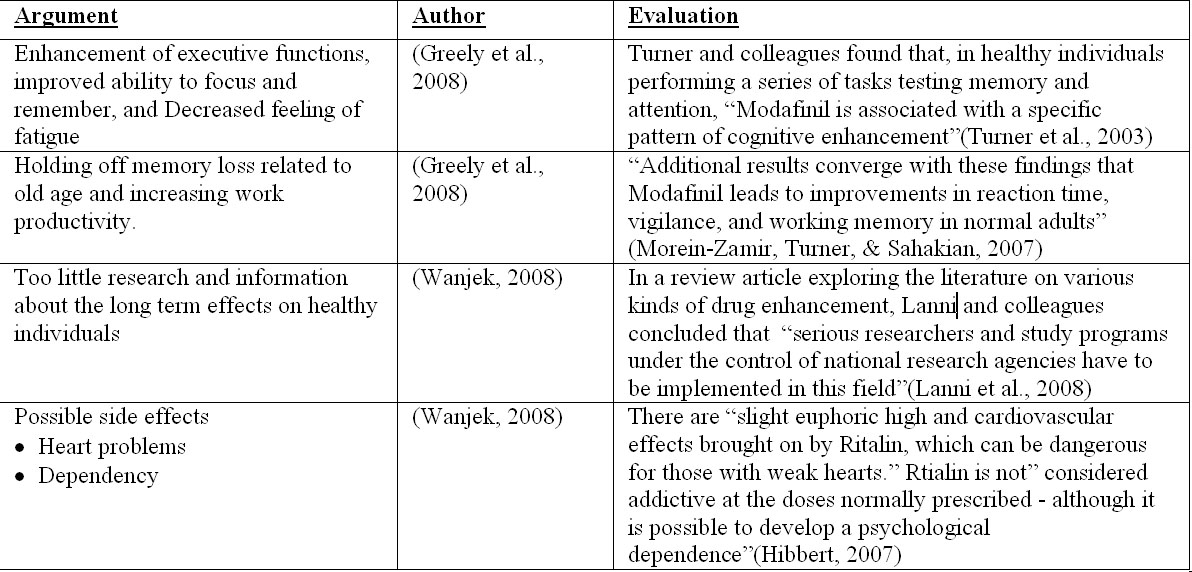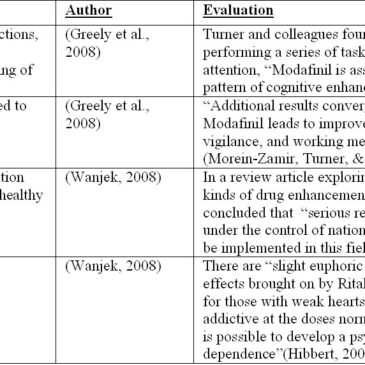Our last issue of Addiction & the Humanities presented one side of the debate about the use of cognitive-enhancing drugs; Greely and colleagues argued that the use of cognitive-enhancing drugs by healthy individuals is akin to the use of good nutrition and better technology to improve performance and should be accepted by society as part of the next wave of self-improvement methods (Greely et al., 2008). This week we present the other side of this discussion: the argument against the use cognitive-enhancing drugs by healthy individuals.
In a column for the website LiveScience.com, Christopher Wanjek argues that Greely and colleagues do not fully address the potential long-term consequences of using drugs for cognitive enhancement. Table 1 below summarizes their primary opposing arguments. Wanjek’s main point is that there is not enough information about the long-term effects, on healthy individuals, of drugs like Ritalin and Aderall to defend widespread use for cognitive enhancement. These drugs can have serious side effects (e.g, heart problems and chemical dependency, respectively). Further, Wanjek argues, the “reported minimal boost in cognitive ability is anecdotal.” According to Wanjek, use of these drugs by healthy people is a risky decision with little scientific evidence to support the benefits (Wanjek, 2008).
The use of cognitive enhancing drugs raises ethical questions. If these drugs provide substantial long-term enhancement, Wanjek argues, then whose needs should be prioritized? Healthy individuals interested in purchasing cognitive-enhancers for self-improvement would be competing with individuals who need cognitive enhancers as treatment for diagnosed conditions. The principles of supply and demand could spark debate about the importance of treatment needs versus the importance of self-improvement. Wanjek also voices another concern about the use of cognitive enhancers by healthy individuals – the widespread use could yield a society of “genetically manipulated” individuals. Today’s culture, commends minimally enhanced (but diligently practiced) talents and skills; a change in society’s genetic make-up would make it difficult to differentiate between drug-induced and natural creativity.
Conclusion
The debate surrounding cognitive enhancing drugs is intimately tied to public and personal opinions about a variety of values: principles (man-made versus natural enhancers), rules (who should get these drugs and how), and cheating (cognitive-enhancers give an unfair advantage). Previously questioned forms of self-improvement such as vitamins (in pill form), technology, and even some medical procedures are currently mainstream; however, society’s acceptance of general cognitive-enhancing drug distribution would call for an acceptance that many future successes and accomplishments would develop as a consequence of these drugs. Perhaps cognitive enhancers, man–made substances, are simply the next logical step in progressive self-improvement.
If this is the case, how will this discussion, intimately tied to addiction research, change the study of addictions? In the final part of this series, we will explore the details that associated addiction with the use of cognitive enhancers.
Table 1: Evaluating key arguments for and against general use of cognitive-enhancing drugs.
– Ingrid Maurice
What do you think? Please use the comment link below to provide feedback on this article.
References
Greely, H., Sahakian, B., Harris, J., Kessler, R. C., Gazzaniga, M., Campbell, P., et al. (2008). Towards responsible use of cognitive-enhancing drugs by the healthy. Nature, 456(7223), 702-705.
Hibbert, K. (2007, November 8). Ways to make you think better. guardian.co.uk.
Lanni, C., Lenzken, S. C., Pascale, A., Del Vecchio, I., Racchi, M., Pistoia, F., et al. (2008). Cognition enhancers between treating and doping the mind. Pharmacol Res, 57(3), 196-213.
Morein-Zamir, S., Turner, D. C., & Sahakian, B. J. (2007). A review of the effects of modafinil on cognition in schizophrenia. Schizophr Bull, 33(6), 1298-1306.
Turner, D. C., Robbins, T. W., Clark, L., Aron, A. R., Dowson, J., & Sahakian, B. J. (2003). Cognitive enhancing effects of modafinil in healthy volunteers. Psychopharmacology (Berl), 165(3), 260-269.
Wanjek, C. (2008, December 9). Smart Pills: The Truth About Cognitive-Enhancing Drugs. www.livescience.com.




